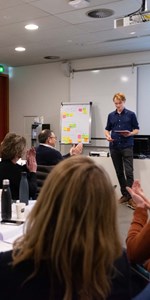The Resilient Delta Initiative (RDI) and the Dutch Association of Insurers have signed a Memorandum of Understanding. The agreement sets out theirjoint intention to develop knoledge on how and where to build and live in our low-lying delta in a climate-adaptive way.
"Climate-adaptive building and knowledge about the right locations for build are hugely important to prevent and, where possible, reduce damage caused by extreme weather ," Richard Weurding stressed. He signed the memorandum on behalf of the Association as general director.
Weurding is convinced that merging scientific knowledge with insurers' expertise on risk and damage is a step forward. "Climate change damage must remain insurable. Climate-adaptive solutions can enable, and where possible accelerate, future-proof construction."
Major social challenge
According to Arjan van Timmeren, scientific director of the Resilient Delta Initiative, the collaboration fits in seamlessly within the spatial development puzzle that the Netherlands. Van Timmeren believes that society needs a collective approach to solving this challenge. This means building on the expertise of various academic disciplines as well as public and private parties.
"With this partnership, we want to bring insurers, the broader financial sector and other key stakeholders to the table to unlock new insights. Our aim is to foster robust knowledge that meets shared, societal issues."
The memorandum stems from a joint workshop with more than 25 industry experts. Together, they came up with ways to address climate risks for the low-lying Dutch delta. This resulted in a more organized partnership with an initial focus on climate-resilient building, spatial planning, financing and insurability.
About the Resilient Delta Initiative (RDI)
To create solutions to the urgent and complex societal challenges of our time, TU Delft, Erasmus MC and Erasmus University Rotterdam join forces within Convergence.
The Resilient Delta Initiative, part of Convergence, tackles major societal issues in deltas through transdisciplinary research. This brings together knowledge from alpha, beta, and gamma sciences. This approach connects science with practice and links long-term solutions to short-term actions. By working closely with both the public and private sectors, the Resilient Delta Initiative aims to develop a future-proof delta.
Was this article useful?


